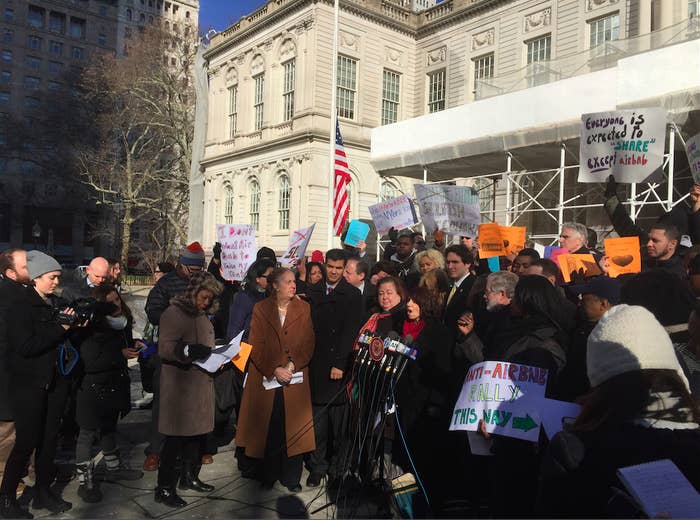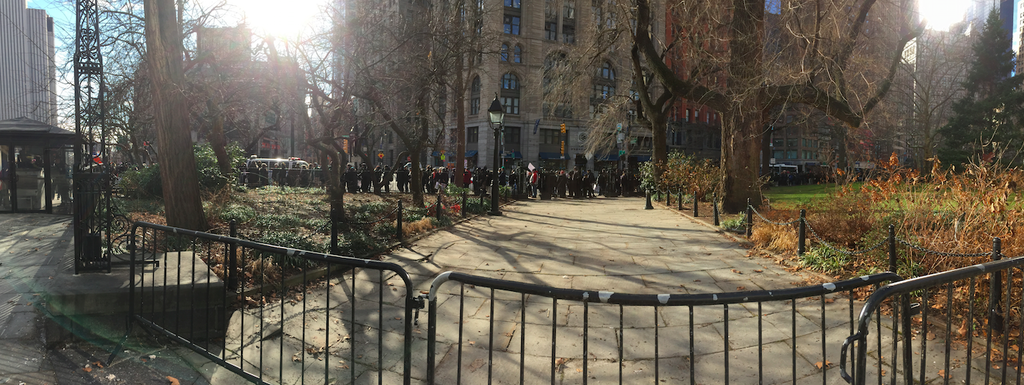
The New York City Council's Committee on Housing and Buildings hammered Airbnb at an oversight hearing today designed to explore whether short-term rentals facilitated by companies like Airbnb, HomeAway, and VRBO were stimulating the economy or hurting New York City neighborhoods.
Though the hearing was meant to explore the short-term rental industry as a whole, much of the focus of the hearing fell on Airbnb, which was referred to several times by the committee as a "bad actor." Committee members repeatedly noted that the company has violated city regulations on several occasions.
Before the hearing, both Airbnb supporters and coalitions against the company held rallies outside the steps of City Hall. Though both sides garnered considerable support in terms of sheer numbers of bodies, the coalition against Airbnb was noticeably stacked with city council members such as Ydanis Rodriguez and Antonio Reynoso, assembly members such as Richard N. Gottfried of the 75th District and Linda Rosenthal of the 67th District, Manhattan Borough President Gale Brewer, and Senator Liz Krueger.
These regulators represent the Share Better Coalition, a group created to expose Airbnb's harmful effects on New York City neighborhoods. However, according to an Airbnb blog post, Share Better also includes members of the hotel industry that "are willing to spend millions of dollars because they don't think regular New Yorkers should be able to share the home in which they live."
The city regulators said that the increase in illegal hotel Airbnb listings, especially in the outer boroughs, directly results in a loss of affordable housing. Illegal hotels, as defined by Senator Krueger (who worked with Assembly Member Richard Gottfried to pass a 2010 legislation that strengthens enforcement of existing regulations on illegal hotels) are apartments in buildings with three units or more that are rented out for less than 30 days when it is not occupied (i.e., the host is not there).
"Every unit that's used all or most of the time for illegal hotel activity is an apartment that's not on the residential housing market," Krueger wrote in a statement. "That means illegal hotels are worsening New York City's chronic housing shortage and increasing the rents of everyday New Yorkers. In some cases, landlords or managing agents who are running illegal hotel operations themselves attempt evict rent-regulated tenants to free up more units for this illegal misuse of housing."
Manhattan Borough President Gale Brewer also testified that she has seen instances where tenants are being evicted in pursuit of a more lucrative, home-sharing opportunity.
"The greatest problem is the threat to tenants by owners who hope to vacate as many units as possible, or even entire buildings, to then be used as transient, illegal hotels," Brewer said. "Over the years I, my staff, and my fellow Manhattan elected officials have all encountered cases where landlords harassed tenants or refused to renew leases, all in an attempt to clear out units for more lucrative use as illegal hotel rooms. We have even seen cases where a landlord's use of an apartment as an illegal hotel room functioned as a harassment tactic aimed at neighboring tenants."
David Hantman, Airbnb global head of public policy, testified in front of the committee, arguing that both the 2010 legislation that Krueger passed and the targeting of illegal hotels is being unfairly applied to more casual Airbnb hosts who only rent rooms in their apartments "four days a year."
"The first thing we need to do is decide are we or are we not after regular people... or are we talking about truly illegal hotels?" Hantaman asked committee chair Jumaane Williams. "We're pretending we're talking about illegal hotels but we're really coming after everyone."
According to a statement from the company, Airbnb has worked to purge its platform of illegal hotels. "Shutting down bad actors is a goal we all share," the statement reads. "In 2014, we removed 2,000 listings managed by hosts who weren't providing a quality, local experience to guests." Hantman did, however, note that Airbnb does not research to see if apartments are being leased illegally.
In the statement Airbnb also contended that there are not enough New York City apartment listings on the platform to effectively disrupt the city's housing market:
"There are more than 3 million households in NYC and approximately 25,000 Airbnb listings, far too few to have a significant effect on housing prices.This is especially true because 87% of Airbnb hosts share only the home in which they live. They aren't taking housing off the market -- they are sharing the home in which they live."
The safety of tenants, neighbors, and guests was brought up multiple times throughout the hearing. Because these listings are not regulated in the same way as hotels, many council and assembly members said that the listings lack clear instructions on what to do in the case of an emergency or a fire. Moreover, as Council Member Karen Koslowitz and Assembly Member Linda Rosenthal testified, renting out entire apartments to transient guests who come in and out and don't have a sincere concern for the safety and well-being of the neighboring tenants put neighbors at risk.
"If I had to vote today, I would vote that they're absolutely illegal and they should all be shut down," Koslowitz said. "It's very disturbing to me ... If my next door neighbor wants to rent out a room in her house and they want to do it in a cheap way ... That person in that house puts my life at risk because we do not know what that person is going to do, what that person would be allowed to do in the house. Not only the people in the apartment [but] you're putting my life at risk and to me it's a very dangerous situation."
Assembly Member Rosenthal cited complaints about the disruptive nature of illegal hotels. "it's common for tenants to complain about an increase of noise, garbage, and vandalism," she testified.
"Tenants often report increase in crimes [such as] burglaries, muggings, and even assault," Assembly Member Rosenthal said. "It is difficult to distinguish those who belong in the building from those who do not. I remember when one of the key tenets of building was never to share the front door key [to the building]. [It was] the first and main means of protection from people who don't belong in the building."
Brewer also testified against Airbnb for its effect on neighboring tenants.
"A home is a home; public space is public space," Brewer said. "And transient hotels and hostels are just that: public space. This qualitative difference is embodied in the law for a reason – to protect tourists and other transient visitors on the one hand, to protect residents and residential housing on the other."


Council Member Ydanis Rodriguez, who is also the chair of the transportation committee that recently held a similar oversight hearing on companies like Uber, compared Airbnb to the ride-hailing giant.
"I look at Airbnb and my comparison is Uber," Rodriguez said. "They don't want to follow regulations ... If Airbnb would like to stay in New York City they should be a good business corporation [and pay taxes] and they should know that's the only way they could be in New York City."
Even committee chair Williams, who admitted he came into the hearing hoping to be enlightened by both sides of the debate, was truly amazed by Airbnb's lack of focus on legality.
"Why are you not paying any attention to legality of the thing you base your business model on?" Williams asked. "I'm just amazed at how bad it really seems and the impact on the city. You're hiding under the guise of people who were probably doing it legally to begin with and we want to focus on people who are doing it illegally ... You really should pay attention to the laws and cities you're setting up your business in."
Council Member Rosenthal took an even more contentious tone with Hantman before later sending him home with a bit of homework.
"Let me make one thing clear: My concern is about all New Yorkers. Your concern is about your revenue."
Later, in a second round of questioning, Council Member Rosenthal asked that Hantman come back to the council with specific data analysis about the number of people who are renting out their own home when they're not there more than one time a year, how often they rent, and if there are multiple rentals in one building.
In the past, Airbnb has resisted requests for data from New York Attorney General Eric Schneiderman until Schneiderman was forced to subpoena the company in October 2013 and again in May 2014.
"If we knew that information, we would know we could send in the fire department and enforcers to make sure everyone's safe," she said.
